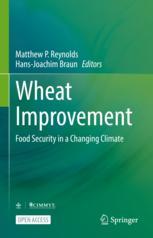Food Security in a Changing Climate: Wheat Improvement
Wheat is one of the food crops with the most potential to cope with the effects of global climate change, especially droughts. Wheat is a pillar of food security.
In this series of interviews, we talked to book authors and editors about how publishing open access has extended their impact and reach, something that is especially important to topics related to the SDGs.
Could you share a short introduction to your OA book? What were you hoping to achieve with your book?

The textbook Wheat Improvement: Food Security in a Changing Climate was developed with three main objectives. One was to put together a compendium of knowledge about the theory and practice of wheat improvement to serve as a guide to students and scientists wishing to brief themselves on areas outside of their own expertise. A second objective is to disseminate the information in this book as widely as possible given the global reach of the wheat crop which extends to over 200 million ha each year. Lastly, as with any textbook, this volume benchmarks the state-of-the-art in wheat breeding at a key moment in the history of agriculture. Decisions and actions that are taken now will be pivotal to future food security for several reasons, for which crop breeding -if adequately resourced- can provide at least partial solutions.
Which SDGs is your book related to?
Since wheat constitutes 20% of all calories and protein consumed by humans, the book is related to the first three SDGs: Zero Hunger, Good Health & Well-being, and Reduced Poverty.
Why did you choose to make your book available on an open access basis?
We chose open access as many wheat colleagues -particularly in the Global South- work with very restricted budgets, so access to costly literature is therefore limited. The whole volume can be shared electronically, printed locally, and even translated to other languages without restrictions.
How was the open access fee (book processing charge) funded?
The cost for publishing this volume open access was covered through a grant from the Bill and Melinda Gates Foundation.
Why did you choose to publish this book with Springer Nature?
Springer approached the editors and we were glad to work with this respected publishing house.
How were you hoping that open access would help with achieving your goals?
Wheat is a pillar of food security and crop productivity represents a cornerstone of civilization. However, many factors now threaten food security. These include a less predictable and generally harsher climate; declining water resources; wide scale attrition and disappearance of arable soils; a burgeoning population with increased demands for wheat products; grave concerns about the evolution of new pests and disease races and the threat of crop pandemics looming closer as some diseases are already jumping species barriers; an imperative to reduce the environmental footprint of agriculture to help avert devastating sea level rises for example, associated with global warming; a need to produce more on the same land to decelerate encroachment of agriculture into precious natural ecosystems, and the list goes on. That given, it is essential that disciplines come together to improve wheat productivity and resilience to harsher climates in a timely way. This book was designed to pull a significant body of knowledge together into a single volume to help accelerate adaptation of wheat through breeding.
What benefits or impact have you seen from publishing this book open access?
The work has been downloaded ~150K times in less than 3 months which indicates the interest in wheat improvement and that knowledge dissemination is being achieved.
Do you have any advice to others considering publishing their next book or chapter open access?
Open access should be considered where broad dissemination is intended and is likely to provide widespread benefits. The costs can if necessary be shared among all contributors if a suitable sponsor cannot be identified.
Would you publish open access again?
Yes, every chance we can get.
Take a closer look at Wheat Improvement: Food Security in a Changing Climate. We also invite you to visit our SDG OA Book campaign page, as well as our hubs for SDG 1 ‘End Poverty in all its Forms Everywhere’, SDG 2 ‘Zero Hunger’ and SDG 3 ‘Good Health & Wellbeing’.
Matthew Reynolds is Distinguished Scientist at the International Maize and Wheat Improvement Centre (CIMMYT) and currently leads the Wheat Physiology lab developing breeding technologies for climate resilience and yield potential. He has been active in developing global collaborations to tap into expertise of plant scientists worldwide (International Wheat Yield Partnership, Heat and Drought Wheat Improvement Consortium) with a view to underpinning food security through crop improvement, with a special focus on the Global South. He has been included in the top 1%, of the world's researchers since 2018 -most recently across plant and animal sciences- by Web of Science. He has honorary positions at Nottingham, Texas A&M, Oklahoma State and Murdoch Universities in relation to his role in mentoring PhD students and research collaboration. He is Fellow of both the Crop Science Society of America and the American Society of Agronomy and was appointed to the Mexican Academy of Science in 2018. Reynolds is an alumnus of Oxford (BA), Reading (MSc) and Cornell (PhD) Universities.
Matthew Reynolds is co-Editor of the open access textbook Wheat Improvement: Food Security in a Changing Climate.


